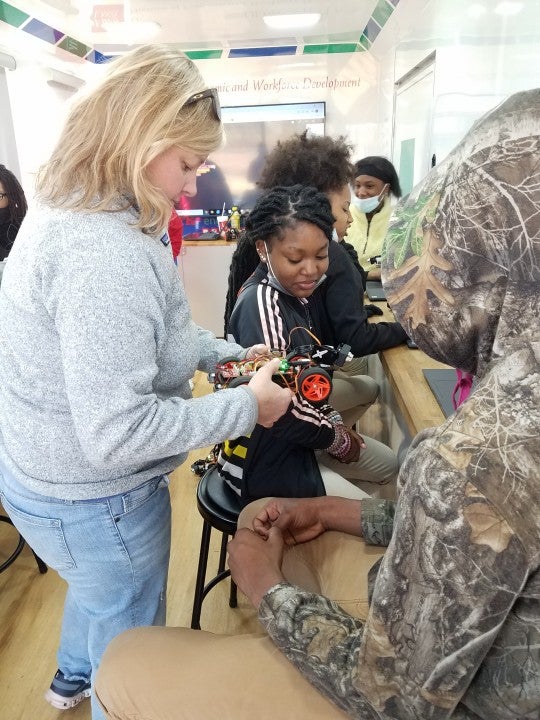Skills on Wheels rolls into Dixons Mills
Published 10:52 am Wednesday, February 23, 2022
|
Getting your Trinity Audio player ready...
|

Students at MHS enjoyed learning to build and program a robotic car with the visiting learning lab from UWA.
The Skills on Wheels Learning Lab is currently visiting rural areas to bring unique opportunities for students to get hands-on experience with thing they normally wouldn’t such as robotics. The lab made its first stop at MHS in Dixons Mills on February 11.
The lab units are part of LINCS (Leveraging Interconnected Networks for Change and Sustainability) which is a project to develop a rural regional workforce based on industry-recognized credentials and need in order to strengthen the economy and population in West Alabama.
LINCS is comprised of a 10-county service area in the area known as the Black Belt. LINCS is funded by a $2.5 million grant from the U. S. Department of Labor and the Delta Regional Authority. Each unit is 23 feet long, nine feet tall and eight-and-a-half feet wide.
The purpose of LINCS is to increase the advanced manufacturing skills sets and employment in the region’s under-served 10 counties, which include: Sumter, Choctaw, Clarke, Greene, Hale, Marengo, Perry, Pickens, Washington and Wilcox.
The learning lab spent a week at MHS where students worked together in groups and learned how to build and program a car. Each group presented their finished projects to class to demonstrate their understanding of robotics and coding. MHS teacher Leon Walker said that the lab was a success and gave his students the chance to do something hands-on which they do not get to do in the classroom.
“Most of the student body were serve are hands-on leaners. In the classroom, it’s sometimes hard to teach when many of the things we do don’t require a hands-on approach,” said Walker. “It’s a big help to our students and how they learn.”
Walker said his classes all did well with the learning lab and that it was “smooth sailing” because every student was doing something productive and learning a new skill.
Over the course of the week, students learned about problem solving skills, critical thinking, and applying the scientific method to find a solution. Walker said these skills were important for his students to learn as they can translate into life.
“Some of my students are afraid to make mistakes because they want everything to be perfect the first time around. But in science, mistakes are valuable,” said Walker. “If you mess up you can learn what went wrong and where and fix the issue.”
Walker said that having something like the learning lab in the area is very important for rural schools because it offers students a different outlook, and exposes them to things they may not have known before.
“If they actually put their hands on something and create something, they might turn it into a future career. It makes them think about what classes they need to take in high school to get ready for college,” said Walker. “If they are experienced and can build it themselves, that be the seed that grows into something special.”
Dr. Tina Jones, Vice-President for Economic & Workforce Development at UWA, echoed Walker about the importance of bringing these labs to rural areas.
“Giving our K12 students and their teachers the opportunity to integrate STEM standards while exploring drone technology, building solar-powered cars and working with 3-D printers and more ensures a connected workforce pipeline from the present to the future,” said Jones.
“The Skills on Wheels Learning Lab and our partnership with Betabox allow us the flexibility to take experiences to the schools while also creating a support system for the teachers and a workspace for the students where they can begin to visualize and discover potential career pathways together.”

